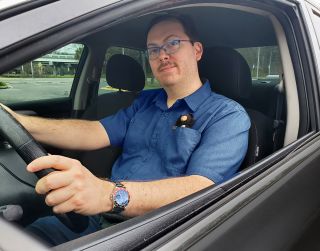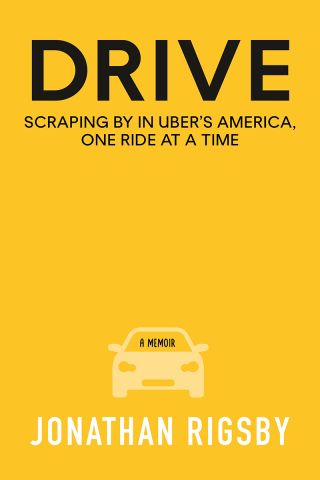Processing My Divorce One Uber Ride At a Time
In the grind, connecting with passengers provides a respite.
By Jonathan Rigsby published May 7, 2024 - last reviewed on May 21, 2024

Things get damaged when you get divorced. When my wife Marie and I first separated, a coworker told me that marriage bound two people together, and any separation was going to involve “a rending of flesh.” I had expected it to hurt, but the aftermath left me emotionally shattered. I was depressed, anxious, and increasingly panicked by the shrinking balance of my bank account. I never expected the answer to my mental health issues and my financial problems to come from being behind the wheel of my car.
I had a job as a crime intelligence analyst for the state of Florida, but after the divorce, I needed to pick up a second job to make ends meet. Uber made big promises that I could choose my own hours and “be my own boss.” Soon after signing up, I was spending most of my nights and weekends ferrying the rowdy undergraduates of Florida State University to and from their parties.
Every time a passenger asked me why I had become a rideshare driver, I panicked. I could barely explain my job as the “taxi man” to my 2-year-old son, Alex, much less a car full of strangers. I practiced telling the story: I’d moved to Tallahassee with my girlfriend so she could get her graduate degree. If they asked if we were still together, I’d tell them things hadn’t worked out. Then I’d change the subject.
Or I’d lie and simply pretend to be someone else. With my baby-faced appearance, people often assumed I was in my mid-twenties. They asked if I was a student at the university, and at times I went along with it. I was a graduate student in meteorology, you see, trying to find a better way to detect tornadoes. I was an accountant for a local business, drumming up some extra cash. I was a full-time driver. An aspiring stand-up comedian. Anything was better than the truth.
I explored all the people I might have been if I had lived a different life. I tried on the identities of people whose lives hadn’t gone awry, people who were successful or striving or hoping. I told strangers that I was saving up for a vacation, that I was going to backpack across Europe or visit a Japanese hot spring. Every passenger became an opportunity to imagine a better life.
This chameleon act was useful for the nights when I couldn’t bear to think about my situation. Those were the nights when I took my old wedding ring out of the box in my closet and slipped it on for the night. When passengers asked what brought me to Tallahassee, I could answer their follow-up questions about whether I was still with my girlfriend by tapping my hand on the back of the headrest to show off the golden band. The college girls found this particularly thrilling, and I basked in their adoration at my commitment. When they asked why I was driving, I told them I was earning extra money for the down payment on our dream home.
Deep down, I knew what I probably needed was a good therapist. But the insurance I had through my day job covered a limited pool of providers. Some required me to pay upfront and submit receipts for reimbursement through my health insurance provider, an extra step I had neither the time nor the free cash flow to pursue.
With money in short supply, the best I could do was connect for a brief moment with the strangers in my backseat. They would talk to me about their lives, and I could offer them my advice. I could draw on my own experiences to try to solve their problems. Eventually, I could test out talking about my own situation.
On weeks when I was strong, I would test my limits by telling people more of the truth. I would let my emotions peek out, little by little. As passenger after passenger asked me why I had become a driver, I was forced to confront and desensitize myself to the pain of admitting that I was divorced. Even saying the words “I’m divorced” out loud was enough to make my emotions well up inside me at first, but after months of practice, I became accustomed to saying the words and watching for a reaction.
Most people gave some measure of sympathy, and a few told stories of their own. Middle-aged men usually took it as an opportunity to talk about their own divorces, while women wished me happiness for the future. No one gave me the harsh judgment that I felt I deserved, and eventually, I was able to convince myself that perhaps I shouldn’t think of myself as a total failure. It wasn’t therapy, but it was something.
With no place to process what I had gone through, I dealt with my emotions behind the wheel. It was a place where I was in charge, where I was both literally and metaphorically in the driver’s seat.
The reactions of the college students were by far the most comforting. While older men would sometimes rant hatefully about their exes and couples would awkwardly change the subject, the students simply accepted me. At times, their own lives were as complicated as mine. This was the case near the end of the academic year when I picked up Sandra and her friends.
The three girls were dressed in sparkling gowns, clutching small purses and wobbling in heels that were too high for their level of intoxication. As I watched them stumble toward the car, I slipped my ring off and stashed it in the center console. They looked friendly, and I assumed I wouldn’t need my golden talisman’s protection from a group of sorority girls on their way to some sort of formal event.
Sandra climbed into the middle of the backseat, taking a moment to scoot the shimmery fabric down as she settled in between her friends. Mere moments after they piled in, the predictable questions started. Was I from Tallahassee? How long had I been driving? Was I still with the girl who had brought me to the city? I took a moment to breathe before telling them that we had gotten divorced the previous year.
“Oh, my parents are divorced,” one of the friends chimed in. The other nodded sagely beside me and told me that hers were too, and it had turned out okay. As her friends told me that it was too bad and they were sorry for me, Sandra chose a different route.
“Did you guys have any kids?” she asked. Yes, I said, tapping the home button on my phone to show off the picture of Alex that served as my background. Sandra’s friends cooed that he was cute.
“Just make sure that he knows you still love him,” she said. Sandra went on to say that her parents were divorced, and she had been dealing with their fighting about who would come to her graduation. Two grown adults despised each other so much that they couldn’t bear the sight of one another for even a few hours to celebrate the accomplishment of their child. She said it was yet another episode in a long line of one-sided holidays where she’d had to play peacemaker.
As she spoke, her friends passed her tissues to save her from smearing her eye makeup with her tears.
“Most of the time it’s not so bad. It was only a big deal at, like, Christmas. That’s when I really wished we could have been together.”
I told her that I wasn’t going to have that sort of relationship with Marie. Even if we weren’t together anymore, I didn’t want us to be enemies. I’d never wanted that, not for us or for Alex. I hated the middle-aged men who spoke scornfully of their ex-wives. No matter what had passed between us, Marie was my son’s mother, and that alone made her worthy of respect.
Sandra told me that she wished her parents could have had my attitude. Perhaps that was the reason she had joined the sorority in the first place, to try to find the sense of family that she had lacked as a teenager.
I dropped the young women off at the colossal brick stadium of FSU for whatever formal event was being hosted there. My next ride was already waiting for me a few blocks away. As I rolled up, I looked down at the center console and thought about the ring inside. I wondered about Alex, asleep at the house. Did he miss me when I was out working? Did he wake up wondering where I was? Would he tell his friends that his parents were happier apart, or would he pine for us to be together again?
I looked down at a black stuffed bear that sat in my cup holder. A toy from a McDonald’s Happy Meal, it had come from a promotion for endangered animals. I carried it with me in the car as a symbol of Alex. Ever since he’d been born, he’d been my little bear. The stuffed animal was my way of taking him with me wherever I went. I picked up the little bear as I waited for my passengers and thought about Sandra’s words.
It’s only a big deal at, like, Christmas.
I sure hoped so.
Jonathan Rigsby is the author of Drive: Scraping By in Uber’s America, One Ride at a Time.

